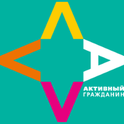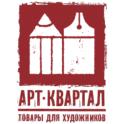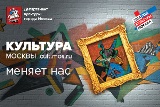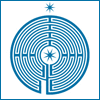LIBRARY OF HISTORY OF RUSSIAN PHILOSOPHY AND CULTURE A. F. LOSEV HOUSE
Moscow, Arbat, 33. Page 1.
Page: ,
History Pages
The building of the Library is a historical and cultural monument of the 19th century. Previously, the property of the Chaadaevs was here. Later, it was owned by Princes Golitsyn and the Kokoshins. After the fire of 1812, the new landowner M. I. Lopyrevsky ordered construction of a new three-storey house (design by architect I. Y. Bykovtsev). Until 1917, there were a maternity home and shops in the house. Later, it housed residential premises and editorial offices of academic journals.
The great Russian philosopher, enlightener, aesthetician, specialist in the ancient culture, scholar and scientist Alexei Fedorovich Losev lived here from 1941 until 1988.
The Library opened on 23 September 2004 on the birthday of A. F. at the 33 Arbat street. Cultural and Enlightenment Society Losev Colloquia and Culture Department of the Central Administrative District of Moscow initiated establishment of the Library. The major sponsor is the Prefecture of the Central Administrative District.
About the Library
It is the only public specialised philosophical library in Russia, not big, but thoroughly selected and very modern.
The stock is based on over 10 thousand books from the famous collection of Alexei Fedorovich Losev. This truly unique collection was handed over to the Library by emeritus professor of the Moscow State University Aza Alibekovna Takho-Godi, pupil and heiress of the philosopher.
The reading halls (public and academic ones) and mediateque provide the users with both books and media resources. The internet gives access to scientific periodicals, catalogues of the largest libraries, full-text databases of legal instruments and thesis works. The Library has a conference room and exposition dedicated to Alexei Fedorovich Losev.
Our Library is a scientific, memorial and educating Intellect Centre working under the programme of Culture of the Historic Centre of Russia.
Welcome to the hospitable and cosy House of Russian Philosophy!
Alexei Fedorovich Losev
(11/23.09.1893 – 24.05.1988)
Born in Novocherkassk, he graduated from the Moscow University in 1915. Was a member of the religious and philosophical society in memoriam of Vl. Solovyov gathering the cream of Russian philosophy of the Silver Age. The publication of his book The Dialectics of Myth in 1930 was followed by his arrest. After imprisonment, he was prohibited from practising philosophy. It was only in 1953 when his works were published again. Now, there are over 800 items in the list of his works, including the monumental History of Ancient Aesthetics.
Losev lived at 33/12, Arbat for almost 50 years. He deceased here. The showcases of his memorial exposition display his personal effects, photographs and documents and documentaries are shown on a plasma panel. A bust of Alexei Fedorovich Losev will be fixed up in the patio of the Library.
Losev (Academic) Reading Hall
Here, the readers have the unique opportunity to use books from the personal collection of Alexei Fedorovich Losev and Aza Alibekovna Takho-Godi. This multilingual collection consists of works of philosophers, philologists, classics of ancient literature, books in theology, musicology, mathematics, etc. The range of academic interests of Losev was incredibly wide.
The destiny of these books is as dramatic as the life of their master. Revolution, political repressions and war inflicted losses on the collection thrice, but a part of the books miraculously survived. Now, readers may touch their pages having visible traces of tragedies on them. The collection contains many books with inscriptions and notes of famous scholars and philosophers and, certainly, all publications by Alexei Fedorovich Losev.
Public Hall and Mediateque
Open for all readers of 14 years and older. The stock contains all the latest publications and CDs in philosophy, history, cultural studies, religion studies, art criticism, philology and regional studies, books from private collections of well-known scholars, encyclopaedias, dictionaries and periodicals.
There are modern computers connected to the Web in the halls. An electronic catalogue makes it possible to promptly find and order books, view pictures of front pages and tables of content.
In the mediateque, one may listen to audiobooks and music, make virtual tours and use electronic encyclopaedias and training programs unique in their information value.
You may also gain access to all our catalogues and become our reader via our website!
Page: ,

- Культура – вещь бескорыстная. Беседа с Еленой ТАХО-ГОДИ.
- 02 - 11 сентября 2016 года - Всероссийский фестиваль энергосбережения "ВместеЯрче"
- 6 сентября 2016г. Ярмарка вакансий для молодёжи "Первый шаг к успеху"
- 12-24 сентября 2016г. Международная научная конференция XV «Лосевские чтения»
- 21- 25 сентября 2016 г. Российский форум коллекционеров
- 8 – 9 декабря 2016 г. Международная научная конференция «Д.С.Мережковский: писатель – критик – мыслитель. К 75-летию со дня смерти»
- Программа "Читаем Аристотеля" в Библиотеке "Дом А.Ф. Лосева".
- Детская студия «Карандаш и кисточка»
- Семинар «Творческое наследие А.Ф. Лосева: проблемы и перспективы» Программы
- Семинар «Русская философия» Программы
- Архив новостей
 '
'




-
В августе 2016 года исполняется:
- 14.08 — 150 лет со дня рождения Д.С. Мережковского
- 28.08 — 105 лет со дня кончины Д.Н. Цертелева
- 28.08 — 125 лет со дня рождения В.Н. Ильина
подробнее об этих и других событиях...
2016 - Год Аристотеля...

|























